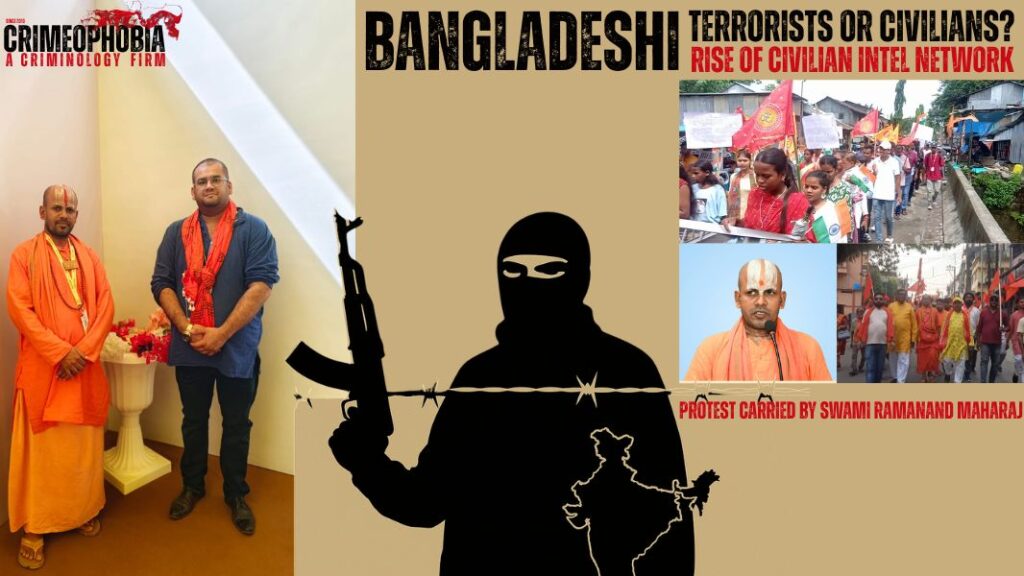
National Security at Stake: Hindu Monk highlights Bangladeshi infiltration hotspots for Civilian alertness
By Staff Reporter
Bureau: As national security concerns rise, alarming developments along India’s northern and northeastern borders are revealing critical infiltration points exploited by illegal entrants from Bangladesh, Nepal, and China. In parallel, mental health professionals are flagging an equally pressing crisis within Indian households—emotional and psychological breakdowns caused by deep-rooted family dysfunction. Swami Ramanand Das Ji Maharaj, a Hindu monk and the first known religious figure to publicly protest the genocide of Hindus in Bangladesh from India’s sensitive border zones, has released a list of infiltration hotspots. These zones are being closely monitored by his team at the Vasudev Yog Seva Ashram in North Bengal as they now collaborate with Crimeophobia, a criminology firm led by Criminologist Snehil Dhall.
The areas cited for repeated unauthorized cross-border activity, largely due to poor fencing and limited patrolling, include:
- Jalpaiguri (Haldibari, Teen Bigha border)
- Belakoba, Jalpaiguri
- Chengrabandha border, Cooch Behar
- Phoolbari, Darjeeling
- Dalkhola, Bengal
- Kishanganj and Purnia, Bihar
- Alipurduar district, Assam
- Kokrajhar and Bongaigaon, Assam
- Bhutan border near Alipurduar and Jalpaiguri
- Paanitanki, Darjeeling (Nepal border)
- Kakarbhitta, Nepal
- Nathu La Pass, Sikkim (China border)
According to the monk, these areas are being used not only for illegal migration but also for human trafficking, narco-smuggling, and suspected terrorist infiltration. Residents living in and around these border zones, as well as across metro cities, are being urged to verify the documents and identity of unfamiliar individuals. What once was a strong friendship between India and Bangladesh, shaped by India’s support during Bangladesh’s 1971 liberation from Pakistan, has now been deeply shaken. India had extended generous support during one of the world’s most tragic genocides, when thousands of Pakistani soldiers surrendered to Indian forces. However, that historic solidarity is now marred by a breach of trust, as illegal infiltration by Bangladeshi nationals continues unchecked.
This breach is not limited to border towns. Citizens in metropolitan areas are increasingly worried about the identity and intentions of undocumented Bangladeshis residing among them. Many fear that some may be sleeper cell operatives posing as migrants—posing a serious threat to internal security. The time has come for national vigilance. The India-Pakistan border has long been under public scrutiny, but the India-Bangladesh border remains dangerously underestimated. To complicate matters, the West Bengal government has been criticized for shielding political violence and obstructing national-level initiatives like Operation Sindhoor, a diplomatic campaign aimed at exposing anti-India propaganda overseas. Recent reports of political murders, anti-Hindu violence, and mob lynchings in the state have only added to the growing sense of insecurity.
While these external threats command attention, an equally urgent crisis is unfolding inside Indian homes. As part of Crimeophobia’s efforts to assess the emotional and psychological toll of the border conflict, a Psychology Intern analyzed photos and videos of Hindu family conflicts near the India-Bangladesh border. Their conclusion was stark: unresolved emotional trauma, generational tension, and domestic conflict are escalating at an alarming rate. Mental health experts now emphasize that family dysfunction is not just a private matter—it carries long-term public health consequences. Children raised in high-conflict households are more prone to anxiety, depression, and behavioural disorders. One of the most disturbing patterns is triangulation, where children are dragged into disputes between parents, causing emotional confusion and deep psychological harm.
To tackle these issues, clinicians are increasingly turning to standardized tools such as the Family Assessment Device (FAD), Family Environment Scale (FES), Family APGAR, and the Work and Family Conflict Scale. These assessments help uncover emotional instability, poor communication, role dysfunction, and adaptability challenges that weaken family units. Additionally, career stress is emerging as a silent disruptor in modern family life. Parents overwhelmed by work often become emotionally unavailable, causing households to drift into chaos. These situations weaken not only individuals but society at large.
Criminologist Snehil Dhall, who also advises on socio-psychological and national security issues, warns that India cannot afford to ignore the interplay between emotional well-being and external threats. “When families are broken, societies weaken. And when social fabric is compromised, national vulnerability increases,” he says. Dhall advocates for a multidisciplinary approach combining psychological tools and direct behavioural analysis to expose systemic dysfunction and hidden trauma. Experts caution that such assessments must be conducted ethically and with cultural sensitivity. Emotional expression varies across communities, and what may appear as conflict in one cultural context may be a normative form of communication in another. Families must be made aware of the purpose, scope, and confidentiality of these evaluations.
India is now confronting a dual crisis—one that lies across its physical borders and another that festers within its emotional core. Strengthening national security means protecting both territorial integrity and the emotional health of Indian families. National resilience cannot rest on military power alone. It requires emotionally stable homes, vigilant communities, and citizens who understand that internal peace is as vital as external protection. The frontlines today are not just at the borders—they exist in every household, every city, and every mind.

Well done. Please suggest line of action to counter the same in detail ….stepwise.
Regards.